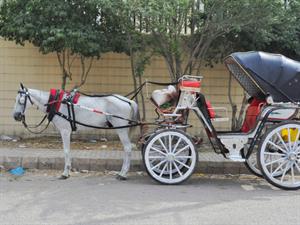PDF chapter test TRY NOW
1. TO the little girl he was a figure to be feared and avoided. Every morning before going to work he came into her room and gave her a casual kiss, to which she responded with “Goodbye, Father”. And oh, there was a glad sense of relief when she heard the noise of the carriage growing fainter and fainter down the long road!
In the evening when he came home she stood near the staircase and heard his loud voice in the hall. “Bring my tea into the drawing-room... Hasn’t the paper come yet? Mother, go and see if my paper’s out there — and bring me my slippers.”
Explanation:
The story begins by introducing a little girl. The little girl's characteristics are not detailed. But the very first line in the story introduces a third person 'he'. The readers are not sure about the third character. But the author makes it clear that he is someone that the little girl dreads of. He is someone who scares the little girl. It is evident that she considers him as someone to be avoided as well. The next line reveals that they live in the same house. He comes over to her room and gives her a casual kiss. By now, it is evident that he is a family member, her father. Usually young girls, try to avoid their brother or a cousin in a childish immature way. But when the author reveals that the young girl responded to the kiss with a "Goodbye Father", a certain amount of curiosity levels up in the reader's mind. It is not clear as to why she tries to avoid her father.

The little girl is scared
The little girl is actually relieved when her father leaves the house. Generally in most households, young girls love their father and would never want them to leave. But the little girl heaves a sigh of relief as she hears the sound of her father's carriage leaving from the house. As the carriage moves further, the sound also grows fainter. Her mind also grows peaceful as her father moves distant. When he comes back home in the evening, he orders everyone about. The little girl stands near the staircase away from her father. He bosses around the house and asks for things to be done. He has a loud voice as he seems to be angry and irritated.

Carriage
In the late 19th and 20th century, men were supposed to be the bread winner and the patriarch of the family. Generally they come home and the women rush about attending to them. In today's world, it is not how things work. Men and women have to share their work equally. He asks the little girl's mother to bring him tea to the drawing room. The drawing room is the centre of the house. He also asks for the newspaper to check for the day's news after a long day of work. He even asks his wife to bring slippers. The little girl who watches all these from a distance is scared of the bossy attitude that her father has.
Words with difficult meaning:
| S.No | Words | Meaning |
1 | Casual | Relaxed and normal |
2 | Respond | To reply back |
3 | Glad | Very happy |
4 | Carriage | A vehicle that is mostly drawn by horses |
5 | Fainter | Becoming mild or dim |
6 | Patriarch | A male who is the head of the family |
Reference:
National Council of Educational Research and Training (2006). Beehive. The Little Girl - Katherine Mansfield (pp.32-35). Published at the Publication Division by the Secretary, National Council of Educational Research and Training, Sri Aurobindo Marg, New Delhi.
